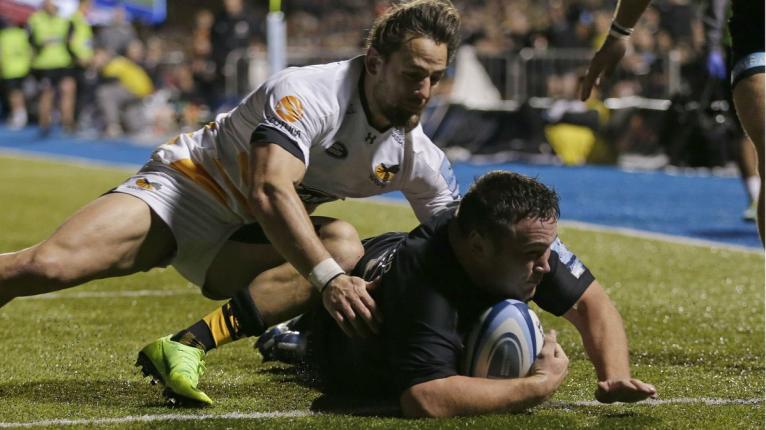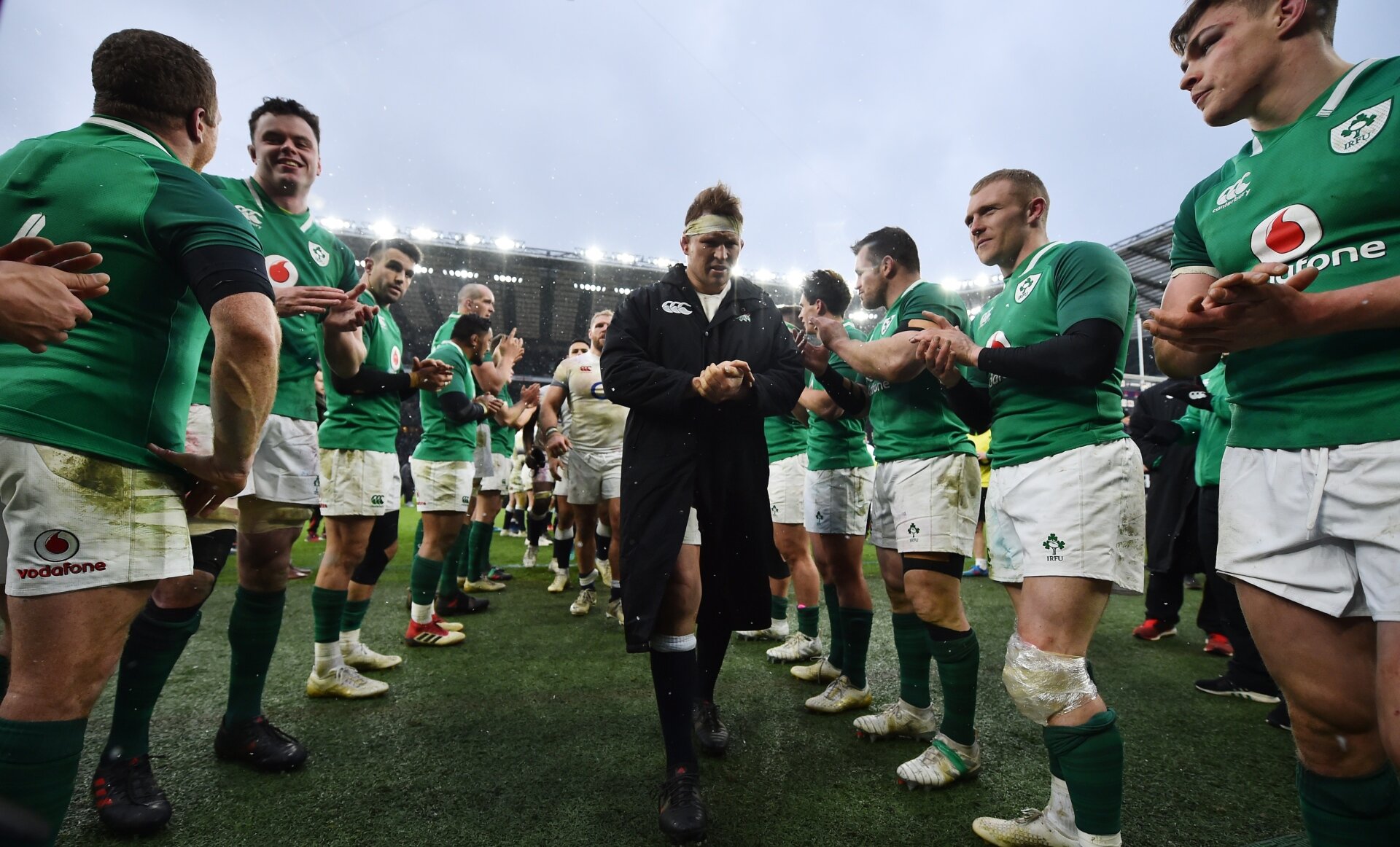The true extent of England players' workload this season compared to Ireland's laid bare

Last weekend provided the latest compelling evidence that Ireland’s IRFU-contracted stars have it much easier than their club-contracted England counterparts.
Whereas 15 of the 23 players Eddie Jones used in England’s one-point defeat to New Zealand started Premiership matches for 10 different clubs, just three of the 23 Joe Schmidt used in Ireland’s historic win over the All Blacks started for two provinces, three more making appearances off the bench.
Admittedly, three other November 17 heroes were unavailable through injury. Kieran Marmion (ankle) and Jack McGrath (hip) won’t be seen again until 2019, while Jordan Larmour has had a minor procedure on a knee.
But those absences can’t muddy the open secret that Ireland’s leading players don’t have the same demands placed on them by their IRFU-run provinces compared to what private English club owners expect from their Test contingent.
Last Saturday summed up the disparity, Leinster sending a near shadow selection to Dragons. The European Cup/PRO14 double winners had 13 players involved against New Zealand, yet Leo Cullen chose just one for the trip to Wales.
Even that duty wasn’t exactly tiring, Andrew Porter only appearing off the bench for the closing half-hour of a contest already decided at that juncture.
Connacht used none of their New Zealand pair, Munster used two of their four, while Ulster used three of their four.
It’s the type of rotation typical of the historical take-it-or-leave-it Irish approach to the PRO14, a tournament that doesn’t have the Premiership’s horrifying pressures of relegation, and this leeway allows the IRFU’s teams to put greater emphasis on chasing European success.
In the Premiership, only 2017 champions Exeter, who face a European double-header with Gloucester in the coming weekends, tested the depth of their squad. All five players who took on the All Blacks at Twickenham were unavailable when Chiefs visited Harlequins at the Stoop.
Saracens also dipped into their back-up, using just two of four representatives from England’s biggest November match. But Bath, Sale, Harlequins, Leicester, Northampton, Newcastle and Wasps started all the players that were on English duty against the Kiwis.
Unlike the IRFU’s player welfare management system, which is aimed at not flogging its best players over the course of a season and instead seeks to have the stars peak and glitter at specific times, the club pressures which exist in England are evident in the disparity of some current appearances/minutes played statistics.
After duty last weekend, Mark Wilson, Jamie George and George Ford have each started nine club games, a respective 720, 628 and 698 minutes of action for Newcastle, Saracens and Leicester.

Their positional Ireland counterparts from the New Zealand fixture, CJ Stander, Sean Cronin and Joey Carbery have started just six, five and six matches. Stander has featured at Munster for 255 minutes less than Wilson, Cronin at Leinster for 300 minutes less than George and Munster’s Carbery has been less busy than Ford by 191 minutes.
There are other glaring examples. Saracens’ Maro Itoje, Leicester’s Jonny May and Wasps’ Elliot Daly have each started eight club matches, featuring a respective 602, 567 and 673 minutes.
Those figures easily eclipse the schedules of their Irish rivals. Devin Toner is 145 minutes and two starts behind Itoje, Ulster’s Jacob Stockdale 314 minutes and five starts behind May, and Leinster’s Kearney 335 minutes and three starts fewer than Daly.
Of the 23s that lined up against New Zealand, there are only five head-to-heads where the England player has been less busy at his club than his opposite Ireland number, suspension putting Sale’s Chris Aston ahead of Keith Earls while injury is the reason Worcester’s Ben Te’o, who is now on pre-Christmas leave from the club following three England appearances, is way behind Bundee Aki.
These numbers are likely to remain stacked in Ireland’s favour heading into the opening match of the 2019 Six Nations championship, which starts with England coming to Dublin.
Watch: Ireland’s Johnny Sexton admits he had doubts about his head coach Joe Schmidt.
It’s nothing new. Ten weeks after last season finished with Test series success in Australia, just two of the 23 for Schmidt’s Ireland in Sydney were on provincial duty on the opening weekend of the PRO14, Leinster’s Ross Byrne and Munster’s John Ryan. In sharp contrast, 10 weeks after England’s season-ending win in South Africa, 21 of the 23 Jones used in Cape Town were in Premiership action.
Freshening up his best players has never been a headache for Schmidt and the luxury it affords set the tone for his stellar year as World Rugby’s coach of the year with an Ireland team voted World Rugby team of the year.
Coming into the 2018 Six Nations, an assessment of how busy the 41 Lions who toured New Zealand had been since that drawn 2017 series laid bare how Ireland were hot title favourites.
Nine of Ireland’s 11 Lions – 81.8 percent – were available to Schmidt for their opener in France. Only the head-ached Jared Payne and the hip-stricken Sean O’Brien weren’t in his plans.
Meanwhile, five of England’s 15 Lions – a more debilitating 33 percent – weren’t in Jones’ Sunday service thoughts for Italy. Daly, Kyle Sinckler and Jack Nowell were all in casualty, with James Haskell and Joe Marler on the naughty step after on-pitch club misdemeanours.
That was an illustration of how Irish resources are given every opportunity to be at their best for the championship. No Irish player featured in the top 10 list of busiest Lions players heading into that Six Nations.
There were eight England names and two Welsh before you got to Stander sitting in 11th spot with 14 Ireland and Munster appearances and 1,058 minutes. In the top 20 there were just four Irish names compared to 11 England and five from Wales.
Curiously, neither of the two busiest Lions – Bath duo Anthony Watson (1,440 minutes) and Jonathan Joseph (1,401) minutes – saw out the season intact. Each picked up serious injury and they have yet to be seen in 2018/19.

Veteran Irish skipper Rory Best is glad to go with the IRFU flow, only playing for Ulster when it’s thought to be in his best interests.
‘The fact is we get a little bit more time off our feet… we know there’s certain expectations, that you’re not going to go over a certain amount of match minutes, or a certain number of games, whichever the combination is.
‘We know that. You get your head around that and you prepare accordingly. You look on at the other competitions (like the Premiership) to watch rugby, not necessarily to have sympathy for any player welfare issues for them.’
This always-on IRFU green light for resting personnel at provincial level will see Kearney, Johnny Sexton, Tadhg Furlong, Toner, James Ryan and Cronin arrive at The Rec this Saturday champing at the bit, as all are without a match in the 21 days since beating New Zealand.
That’s a rest-up very different from Leinster’s last trip to Bath. Ireland were coming off the back of a despairing 2015 World Cup exit when they went to England six days after a home loss to Wasps and lost again with Leo Cullen only newly in charge.
Now the tables are firmly turned. Cullen is a European champion coach and his rested front-liners, having destroyed Wasps in October before getting to grips with New Zealand for Ireland, are poised to emphasise how the way the IRFU caters for them is a winning formula England boss Jones must envy.
CONTRASTING PICTURE
How the 2018/19 club duties of the England and Ireland 23s who faced New Zealand in November compare:
ENGLAND
673 minutes – Elliot Daly (8 starts+1 sub Wasps)
160 – Chris Ashton (2 Sale)
497 – Henry Slade (6+1 Exeter)
29 – Ben Te’o (1 Worcester)
567 – Jonny May (8 Leicester)
560 – Owen Farrell (7 Saracens)
579 – Ben Youngs (8+1 Leicester)
309 – Ben Moon (5+1 Exeter)
445 – Dylan Hartley (6+2 Northampton)
414 – Kyle Sinckler (6 Harlequins)
602 – Maro Itoje (8 Saracens)
432 – George Kruis (5+1 Saracens)
265 – Brad Shields (4 Wasps)
425 – Sam Underhill (5+3 Bath)
720 – Mark Wilson (9 Newcastle)
628 – Jamie George (9 Saracens)
280 – Alec Hepburn (3+5 Exeter)
356 – Harry Williams (5+3 Exeter)
329 – Charlie Ewels (4+1 Bath)
533 – Courtney Lawes (7 Northampton)
531 – Danny Care (7+1 Harlequins)
698 – George Ford (9 Leicester)
400 – Jack Nowell (5 Exeter)
IRELAND
338 minutes – Rob Kearney (5 Leinster)
320 – Keith Earls (4 Munster)
400 – Garry Ringrose (5 Leinster)
430 – Bundee Aki (5+1 Connacht)
253 – Jacob Stockdale (3+1 Ulster)
352 – Johnny Sexton (5 Leinster)
302 – Kieran Marmion (6+1 Connacht)
309 – Cian Healy (5+1 Leinster)
276 – Rory Best (4+1 Ulster)
331 – Tadhg Furlong (5+2 Leinster)
457 – Devin Toner (6 Leinster)
400 – James Ryan (6 Leinster)
595 – Peter O’Mahony (8 Munster)
331 – Josh van der Flier (5+1 Leinster)
465 – CJ Stander (6 Munster)
328 – Sean Cronin (5+2 Leinster)
176 – Jack McGrath (2+3 Leinster)
277 – Andrew Porter (1+8 Leinster)
483 – Iain Henderson (7 Ulster)
362 – Jordi Murphy (5 Ulster)
360 – Luke McGrath (5+1 Leinster)
507 – Joey Carbery (6+2 Munster)
465 – Jordan Larmour (6 Leinster)
Watch: Rugby World Cup Japan city guide – Kumamoto

































